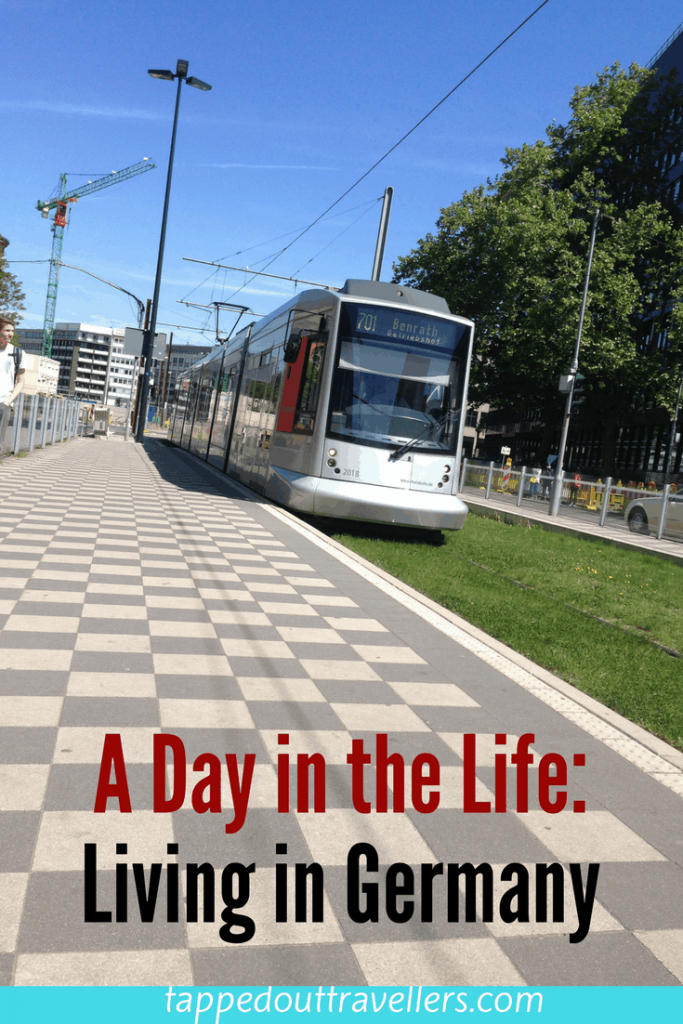Last Updated: July 24, 2022

A Day in the Life living in Germany. Moving here, we knew there would be a few challenges such as cultural differences and a language barrier, but we were up to the challenge.
What’s it like to live in Germany
When we arrived in Germany, we knew there would be a few cultural differences and the language barrier would be a challenge. There are very few words that English and German have in common, and their sentence structure (and word formation) might as well be Ancient Egyptian to these non-speaking ears.
The weather, public transit, daycare and grocery stores were also vastly different than anything we had ever encountered. Considering our House Hunting trip was only the second time we had ever left Canada, the first being Florida (little change there), this was a whole new kind of scary. Living in Germany was going to be interesting but it was a challenge that we were willing to accept and now, here we are. Full immersion and there was no turning back.
Weather in Germany
When our neighbors told us that it rarely snows in Northern Germany, we were ourselves. What kind of Canadian lives in an area without snow?! It rains often, it is windy as sin and the locals consider “cold” weather as 10 degrees Celsius. Every spring, you can spot the Canadian a mile away in our long sleeve shirts and no jacket, while they still waltz around in their parkas and wool hats. As a temperate climate, this part of Germany doesn’t see too much cold weather (actual cold, not “Germany cold” shall we say.
The winters are pretty mild) and the summers aren’t blistering hot. It doesn’t so much rain a lot, more like it rains often. What’s the difference? It rains often, but it is very light and not a lot of rain falls, just enough to darken the sky and leave everyone with a Vitamin D deficiency. In between those rain showers, the skies are clear and you would hardly know a storm just blew by. When it does clear, however, the streets are packed with people walking their dogs and children playing.
Germans don’t miss an opportunity to get outside.
We have all had to invest in a good pair of walking shoes that are waterproof, not just wellies. We each have an umbrella and our jackets (raincoats and winter coats) are 100% waterproof, not just water resistant (when the rain falls that hard or the wind pounds on you for that long, waterproof is required, not just suggested). Our Columbia and Merrell gear is perfect. There are obviously stores here that sell what you need but add another $100 to the price tag and that’s what you are looking at paying for local products. It is best to purchase them back home before arriving. Amazon would be your second best choice.
Very few homes or buildings have A/C, mainly because it is only worth it for a few weeks throughout the year. The windows do not have screens on them, mostly because there are no mosquitoes and the flies are minimal. They will tip in or swing in to let just the right amount of fresh air in. For a better explanation and a few pictures, check out German Girl in America here. German windows also tend to not have window coverings. In my 4 years here, I have yet to enter a home with curtains, and I have never seen curtain rods sold at the hardware store.
They do have, however, a type of storm shutter called Rolladens. Not only do these act as weather protection during rough storms, but they are also your blackout curtains – and boy do they ever black out a room. Not a single ray of sun gets through this thing when closed properly. Lastly, Rolladens are a security feature that prevents baddies from breaking into your house while you are on vacation.
There are spiders here in Northern Germany but they eat bugs and critters that are not afraid of people, so even the landlord has suggested we just keep the house as clean as possible (since dirt and food attract all kinds of bugs) and if we do see a spide, just leave it alone – she is doing more good than harm. Gross.
Transportation
Germany is famous for its public transportation. The local trams and buses will take you everywhere you need to go so a second car isn’t necessarily required in the big city. There are times when I have wished for a second vehicle, but when I think about the monthly car payments associated with a second car, I would prefer taking a taxi if I really needed to get somewhere quickly (which we have; worth every penny).
Trains
While the train schedule looks like it takes forever to get around; 30 minutes to get to the mall or 45 minutes to the zoo, I can guarantee that taking a car would take longer and now you need to find and pay for parking. We have had many friends come to visit us and offer to meet us downtown – they quickly turned around and parked in our spare parking spot and took the tram with us, no parking was available anywhere near their destination.
Driving
Driving in any major city is cause for anxiety but we have found German streets that much more troublesome to maneuver. The streets are not narrow, but they are lacking a definite shoulder. And street parking is permitted just about anywhere, especially in the subdivisions. This easily turns any road into a single lane, two-way road and it’s a first come first bomb through the streets like a bat outta hell. Sufficed to say, we don’t like to drive if we don’t have to.
But we can if we needed to. There are days when it is not possible to get where we want to go, in a timely manner without a car. And hubby can’t get to work out of town without it. The German highways, translated into Autobahns, are “special”. When most North Americans hear Autobahn, they automatically assume we mean unlimited speeds and zero police surveillance. This is inaccurate. There are unlimited sections of the highway, and those wishing to go over 160km/hr have the right of way on the left-hand side (the passing lane). All others stay in the center lane and right lane for exiting, just like any other road. The only difference is the speed. And once you get used to it, driving 100km/hr on Highway 400 in Toronto will seem slow and beneath you.
The Autobahns have 4 lanes, the off ramps have 2 lanes which go in opposite directions. “take exit right. keep left and keep right” are the GPS directions. While this sounds crazy and confusing to read or even to hear, once you see the map or are on the road, it makes complete sense. Always follow the GPS directions, the cars are so close to you and traffic is so heavy that you can’t second guess yourself or the directions.
If you don’t make your exit, it can take a while before you can get to the next exit and find your way back to where you wanted to go. To be fair, even the locals have and use a GPS, it is almost impossible to memorize the roads unless you take them each morning – even then, they are always being improved or another exit is being added.
Like most major cities, there are no school bus; kids are taken to school using public transportation. Most German families allow their 7-8-year-old to travel to school by themselves, even if a transfer is required. There is bound to be more than one kid in their neighborhood going to the same school and they can all travel together and keep each other on track.
Germany, and most of Europe actually, have a strong “it takes a village” mentality. They will watch over your children when you are not present, and in turn, you watch over theirs when they are not present. Adults know this, children know this. Feelings are not hurt and no one gets offended.

Families with Kids
Germans are allowed 1 year of paid maternity leave plus 2 additional years of job security. If a baby is born during this additional time, parents get to tack it on at the end, it is not lost. With this much time off to raise their kids, the public school system looks a little different than they do back home in Canada, or in America for that matter.
Stay-at-home moms send their kids to daycare a few days per week (out of their pocket) until they are accepted into a Kita group (Nursery). Kita starts at 6 months old and goes until the child is 6 years old when they start preparing for Year 1 (Senior KindergarKindergarten). After the child hits their 3rd birthday, many states cover the cost of childcare, since the stay-at-home parent is now forced to go back to work or lose their job.
This is a way to stimulate the economy, in that, now two people have a job – daycare employee and parent. As I said, many states do this. Many, however, do not. We live next to the city of Dusseldorf, many times I would even say we live IN Dusseldorf, that’s how close it is. But, sadly, we are on the wrong side of the border and our Kitas are not covered.
We do get a subsidy from the city, with our tax returns – since we don’t pay local tax, we don’t qualify, but other Expats will. In Dusseldorf itself, even nonresidence have access to the Kita program, they just need to register with the city and hope their child is accepted into the program. If you are moving to Germany with a child, it is best to get on a waitlist as soon as possible – I would even go so far as saying the day after the child is born is a great time to start filling out applications.
For the first few months, I joked with my husband if Germans even have children or do they give birth to 5-year-olds; I never saw toddlers in the streets. Every time I went to the grocery store, or the park, or just for a walk down the street, not a child in sight, unless it was school pick-up time. This is how much the country trusts and depends on the Kita system to socialize its children.
There are a series of local amenities, like zoos, parks, playgrounds, and pools. Their opening times are something to be desired and they are spread apart throughout the city so I don’t use them as often as I had hoped. We have been to the Duisburg zoo several times; it takes about 45 minutes and 2 transfers to reach but we have driven once and I would never do it again. The local pools differ around the city; some can be regular Olympic-style pools, and others have fancy children’s areas and indoor
Grocery
You will end up at the store very often; almost daily. The fridges are small, the packaging is small and the food does not have preservatives or additives in them. This means you will run out quicker or they will go bad before you are done eating them if you buy too much. The milk is in 1.5-liter containers so I buy two milks every other day. I also buy meat, bananas, apples, and veggies every other day or so.
The local grocery store Edeka does not have the water that we prefer so the larger store, Real, is the larger store that we visit Friday afternoons for 4 cases of water and juice, potatoes and other long-term dry items (onions, garlic, oranges etc). Eggs are not washed at the store and therefore remain on the shelf longer, and also don’t need to be refrigerated. Once they are cleaned, they expose the pores on the shell and must be kept cold to keep salmonella at bay.
Therefore, it is important to wash the eggs just before using them. Because of the small kitchen space, even sugar and flour don’t come in excessively large bags (like Robin Hood or Rose flour back home). The stoves are not much bigger than apartment sized either, I have had to put a few dishes and pans away because they simply don’t fit.
Walmart was kicked out of Germany a few years back for it’s purchasing practices. The closest thing Germany has to Walmart is Real. There are other brands across the country but so far, these are the only two we frequent and many of our coworkers and friends have said the same thing.
Tips for Living in Germany
Europeans are very environmentally friendly; you don’t really have a choice when the population is so dense. We have a recycling bin, paper bin, garbage, and compost, just like back home. Most people have a backyard compost bin to help with summer gardening. It is illegal to cut down a tree on your own property without getting a permit from the city.
It is also illegal to idle the car. Since the summers are not too hot, the driveway is covered from direct sunlight and the winters are not freezing, there is no need to idle the car before leaving the house. At grocery stores is another story, I can’t sit in the car with a sleeping baby while hubby goes in the store anymore. Well, I can, I just need to turn the car off and crack a window.
Your Thoughts...
Please share your thoughts in the comments or reach out on social media...We would love to hear from you.
You May Also Like…
Things I will and won’t miss about Germany

